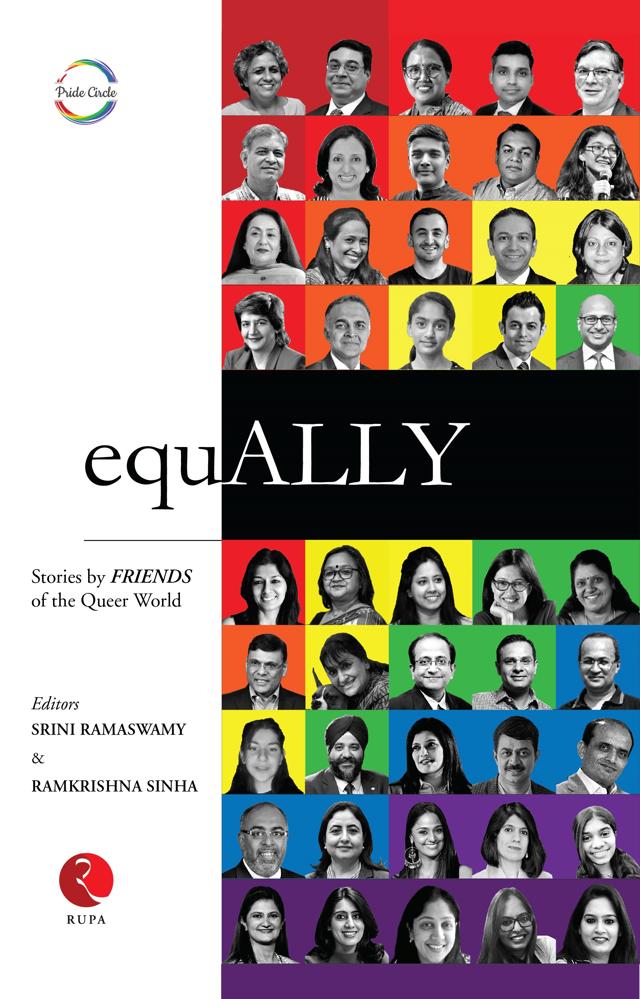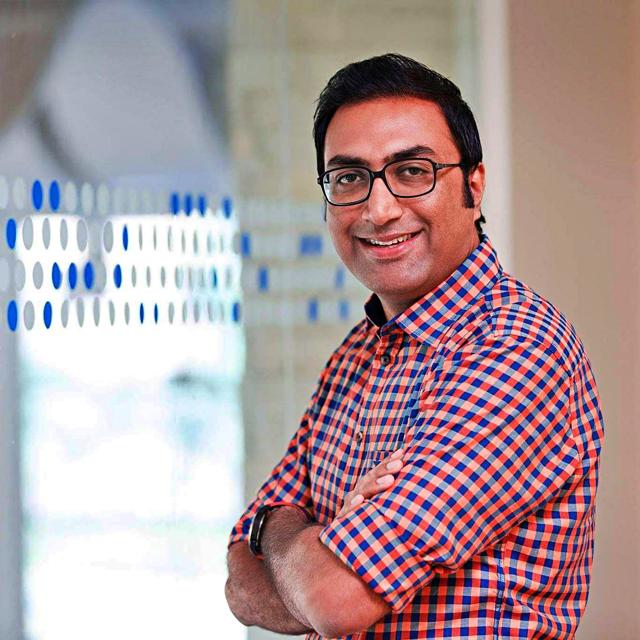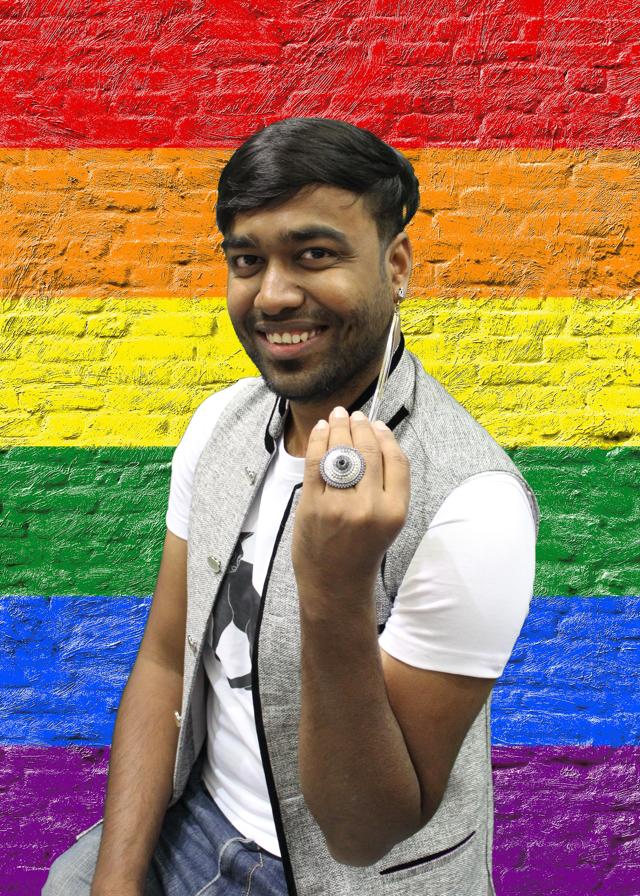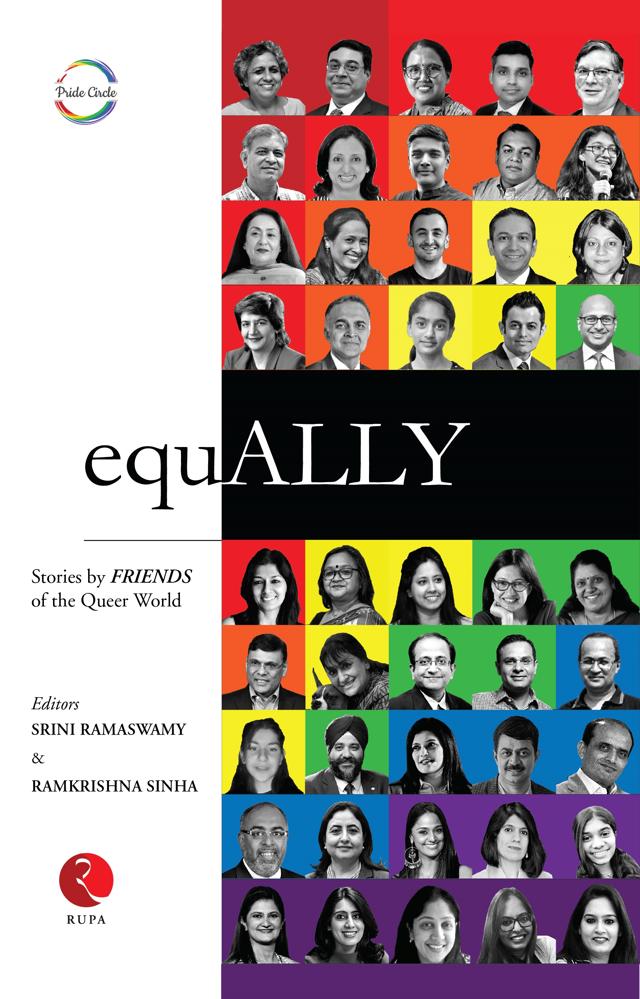
equALLY: Stories by Friends of the Queer World includes 45 heartfelt stories of allies to the LGBTQ+ community. The anthology has been published by Rupa in collaboration with Pride Circle, a diversity and inclusion consultancy founded by co-editors of the book, Srini Ramaswamy and Ramkrishna Sinha. Srini, who identifies as straight, and Ram, who identifies as gay, set up the consultancy to foster a culture of belonging for LGBT+ people through training, sensitization, professional networking and skill development opportunities. The allies featured in the anthology include Anjali Gopalan (Founder, Naz Foundation), Kanak Sahoo (mother of Mr Gay World India 2016 Anwesh Sahoo), Nandita Das (actor in Deepa Mehta’s film Fire), Suneeta Rao (singer), Vedica Saxena (Project Director, Tagore International School), Aruna Desai (co-founder, Sweekar – The Rainbow Parents), Jyotsna Suri (Chairperson and Managing Director, The Lalit Suri Hospitality Group), Ernesto Noronha (Professor, IIM Ahmedabad), Kevin G Kochar (Managing Director, Goldman Sachs) and Karan Virwani (CEO, WeWork India). Excerpts from an interview:
Who, according to you, is an ally?
Ram: An ally is someone who is able to look at the world beyond their own lived reality, understand the challenges faced by the LGBTQ+ community, and become a visible vocal supporter of it. Very few LGBTQ+ people are able to come out because of the stigma attached to their identities, so it is important that allies come out and talk about their allyship.
It’s interesting that you speak of ‘coming out’ in relation to allies! Please elaborate.
Ram: ‘Coming out’ effectively means to feel comfortable and to talk about LGBT+ inclusion as an ally. This person could be a parent being an ally to their children, or teachers conducting sensitization programmes in schools, or companies rolling out policies that affirm LGBT+ employees.
The larger onus to bring change is on allies because they comprise the majority. If they come out, progress can be achieved much faster and LGBT+ people can live with dignity and respect. If allies can stand up and say that bullying will not be tolerated, it will make a big difference.
We have a strong culture of silence about LGBT+ identities in homes, educational institutions and workplaces. LGBT+ people are expected to fly under the radar, not ask for support, and make themselves less visible. Allies can transform this situation, and create an equal space for everyone.
What do you think is the danger in being a silent supporter, and not a vocal one?
Ram: I would like to explain this with an example. A silent supporter would listen to a homophobic joke made by a colleague, not say anything at that point, and later approach the person who is crying and say, “That was horrible. Don’t worry about it. Things will get better.” This kind of support is not helpful; better than that is standing up and saying that the joke is homophobic, offensive, and in bad taste. A person facing harassment and bullying may not have the agency to speak up for themselves in a hostile environment. This is exactly why we need allies to be visible and vocal.
What prevents allies from speaking up? Is it the fear of being perceived as queer?
Srini: Yes, this happens all the time. As a straight person working for LGBTQ+ inclusion, people often ask me questions such as: Are you closeted? Are you testing the waters? Are you on the fence, waiting to jump over to the other side? These questions come from people within the LGBTQ+ community and outside.
This curiosity is partly related to the fact that a lot of people who are now out as being part of the LGBTQ+ community initially started by identifying themselves as allies. They came out about their gender identity and sexual orientation when they felt safe, comfortable and ready for it. This is totally understandable. It is a long process.
Sometimes, straight people wonder why I go for drag nights with my LGBTQ+ friends when I am not from the community. When I wear a pink or purple shirt to a meeting, people sometimes ask, “Isn’t this too gay for you?” There are allies who do not want this kind of visibility. They want to work quietly, and not be vocal advocates. They fear that their homophobic colleagues might think they are queer, and start picking on them. I have faced this but I do not really care now.

Are you saying that people who wish to be allies must prepare themselves to face some of the stigma and discrimination that queer people face in their everyday lives?
Srini: Yes, this conversation about allyship with LGBTQ+ people in the boardroom is very new unlike the concept of women’s empowerment that has been around for a long time. Because LGBTQ+ inclusion has not been normalized or mainstreamed, people do not understand it fully. They laugh and joke about it. Things get particularly challenging for straight men who want to be allies. If women are seen as allies, they are very well accepted. There is an understanding that there are some parallels between what women face and what the LGBTQ+ community faces. Straight men feel vulnerable because they are told, “How can you hang out with those people? How can you be so soft?” It is assumed that they are closeted. Allies may find that their family, colleagues and friends do not understand why they are allies, so they have to explain why equality matters to them.
I’m playing the devil’s advocate here – why do allies need to be celebrated? Why should they get brownie points for doing the right thing?
Ram: We do not live on an LGBTQ+ island. We live with allies. They comprise a larger section of the society we are part of. Most of our initiatives at Pride Circle are about supporting the LGBTQ+ community with employment, mentorship, networking, mental health, skill building programmes. This time, we wanted to focus on allies because they have been an important part of our journey. Before I came out, I read a lot of stories by other queer people. Each one highlighted how they found support in a family member, a friend, or someone at work. If we want more allies, we need to offer a roadmap that will show them how to do it. Our book is an attempt to create role models for allies. A lot of people are well intentioned but they want a blueprint, specific steps and inspiration.
How did you zero in on the people whose stories made it to the book? Did you have an open call for entries, or did you reach out to the individuals you wanted to feature?
Ram: We made a list of around 60 to 70 people, and then brought it down to 45 people. Their stories are included in the book. Many of these are people that we personally know through our work on diversity and inclusion with various kinds of organizations. 30 of these are corporate stories. The rest are stories of parents, siblings, friends, teachers and celebrities who are allies. We did not issue an open call as it would mean devoting additional time to verification.

India is a country of 1.3 billion people today. LGBT+ inclusion is still a topic that is very niche and nascent. It has not received the attention it should have. We would like to publish another set of stories after a gap of maybe a year. This time, we have stories from Bangalore, Mumbai, Delhi, Kolkata and some other places including small towns. Next time, we would like to focus on stories from Tier 2 and Tier 3 cities because they often go unrecognized and need to be celebrated. Our research team has started collecting more stories but we do not want to rush into publication.
What are your thoughts on instances wherein allies wear their allyship as an identity that makes them immune to criticism about their own homophobia, biphobia or transphobia?
Ram: This is a common human phenomenon. There are times when allies think that they know everything. It is not possible. This also happens within the community. Just because I am a gay man, it does not mean that I am fully aware of all the struggles that a trans person faces. I know some trans people but I cannot generalize. Continuous self-education is every important. Allies must understand that they cannot speak on behalf of the LGBT+ community. Vocabulary is evolving. Science is evolving. We are talking more about the intersections of various identities. Even if someone has been an ally for a certain number of years, it is helpful if they are willing to listen and learn.
Chintan Girish Modi is a writer, educator and researcher who tweets @chintan_connect







